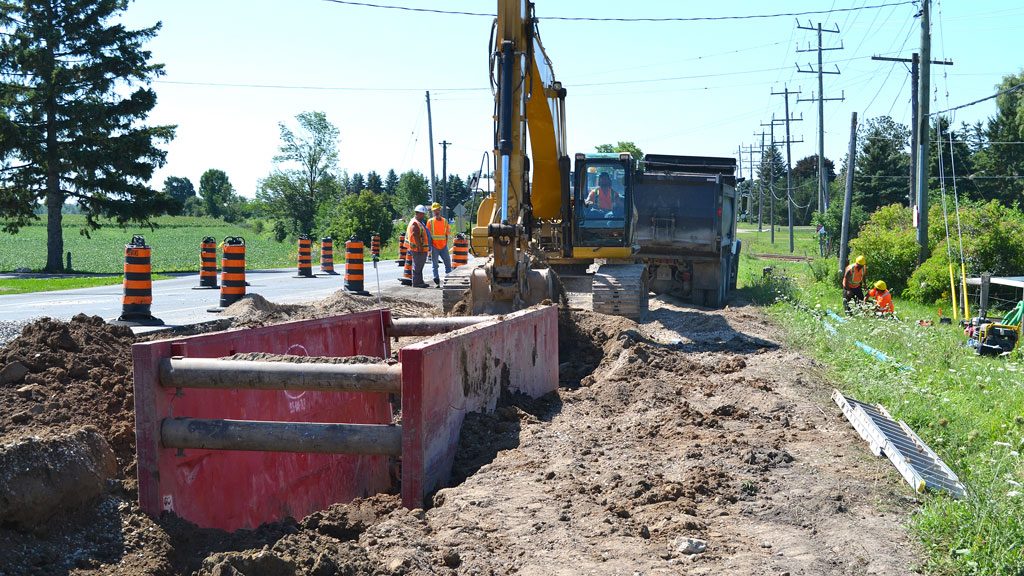The Ontario government has announced a plan to help smaller municipalities prepare infrastructure asset management plans, a move hailed by construction stakeholders as important and worthwhile.
The assistance comes as all municipalities face looming deadlines imposed by the previous government, with each required to develop a strategic asset management policy by July 1, 2019 and complete asset management plans addressing all of their assets by July 1, 2024.
On Jan. 11 Ontario Minister of Infrastructure Monte McNaughton unveiled a plan that will give 58 small communities expert assistance in developing asset management plans, to be delivered by the Municipal Finance Officers’ Association of Ontario in partnership with the province.
“We have to ensure funds are spent in the right place, at the right time and on the right project,” McNaughton said in making the announcement.
“Infrastructure spending has real benefits for the people of Ontario. But in our current environment, spending decisions must be targeted, sustainable and focused on the long term.”
The previous provincial government required the completion of the plans as a condition of future infrastructure investments.
The Ontario Sewer and Watermain Construction Association (OSWCA) produced a report in 2018 calling for stakeholders to increase standardization in asset management plan preparation.
OSWCA executive director Giovanni Cautillo praised the government’s recent initiative and said he hoped it was the start of a broader dialogue to ensure asset management was implemented with the highest degree of standardization possible.
“Overall, we are a strong supporter of the government moving forward on asset management plans,” said Cautillo.
“Right now you have municipalities that don’t have the means or manpower to assess this. If you have a standardized plan for the province, you have solved 90 per cent of the problem right there.”
An example of an effective strategy his association has advocated for, said Cautillo, was urging municipalities to do physical inspections of underground assets such as sewers and watermains to determine their state of repair, as opposed to using official records and assuming assets need replacing.
The OSWCA report noted only the City of Guelph was doing physical inspections of underground infrastructure, Cautillo said.
“You can compare apples to apples across the board,” he said. “You have municipalities who are basing investments on infrastructure with a ridiculous amount of uncertainty. You are guessing for all intents and purposes.”
Statements supporting the initiative came from Bruce Matthews, CEO of the Consulting Engineers of Ontario, and Chris Traini, president of the Ontario Good Roads Association and county engineer for the County of Middlesex.
“Providing the expert resources to communities so they can make sound, evidence-based decisions for their local infrastructure needs is a progressive commitment that will net wide-ranging, long-term benefits for all of Ontario,” said Matthews.
“Asset management planning ensures that municipalities are prudent stewards of the infrastructure that Ontarians need to be competitive in a globalized economy,” commented Traini.
Andy Manahan, executive director of the Residential and Civil Construction Alliance of Ontario, suggested the move shows the Doug Ford government understands the importance of long-term infrastructure planning for all types of projects.
“There is still a tendency for the provincial and federal government to focus on shiny new projects and asset management is secondary but the fact that this is on the books now raises the bar that asset management is being taken seriously,” he said.
“It is important from the point of view of the Ford government in terms of spending money cost-effectively and looking after your assets in a better way.”
Manahan said the approach of assisting smaller municipal governments with onerous new responsibilities could be expanded to cover other initiatives large governments are taking on.
“The other aspect of asset management planning that is important to consider is preparedness by local governments for severe weather events,” he said.
“While there are economies of scale in having Toronto appoint a chief resilience officer or large agencies such as Metrolinx create climate change plans, smaller municipalities would be challenged to undertake this type of analysis. There is likely a role for the province to assist municipalities in this type of resilience planning.”
Cautillo said he hoped the provincial government would further reach out to infrastructure stakeholders as municipalities work towards the 2024 deadline. The logical next step, he said, is determining how to pay for the infrastructure assets. User pay, such as water metering, must be closely linked to asset management discussions, he said.
“The government is assisting the smaller municipalities in setting up asset management on par with other municipalities, singing from the same songsheet,” he said. “The next step is, how are you going to pay for the assets? Especially if you have a limited budget, if your asset system is in disarray, how are you going to fix it?”










Recent Comments